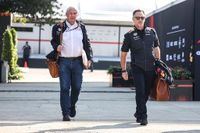In the high-octane world of Formula 1, emotions run high, especially for rookie drivers like Isack Hadjar, who recently faced harsh criticism from Helmut Marko, Red Bull's veteran advisor. Hadjar, just 20 years old, found himself in the spotlight for all the wrong reasons during the season-opening Australian Grand Prix on March 16, 2025. After crashing during the formation lap, he was visibly shaken, tears streaming down his face as he processed his misfortune. This emotional moment caught the attention of Marko, who described Hadjar's reaction as 'embarrassing.'
Following the public fallout from these comments, Christian Horner, the team principal of Red Bull Racing, stepped in to defend Marko's stance. Speaking to reporters after the first practice session in Shanghai on March 21, Horner emphasized the generational differences in views regarding vulnerability and emotional expression within sports. “Look, Helmut’s 82 years of age. He’s old school. He’s a guy who lost an eye and pulled over the car and just turned the engine off. He will always have his own opinion, which he has the right to,” Horner stated.
Marko’s comments were not entirely without context. The 82-year-old suffered a life-altering accident during the 1972 French Grand Prix when a piece of gravel struck his eye, leaving him blind in that eye and ending his racing career. He described the two months in the hospital post-accident as a pivotal point, where he realized he had to move on from the tragedy rather than dwell on the loss. "I was in the hospital for two months. One night I recognized that it’s over - I have to look forward. Either I’m complaining for the rest of my life or [moving on] to something else. I moved forward,” Marko recounted in previous conversations about his early racing days.
This backdrop of Marko’s own tragic history explains part of his rigidity when it comes to emotional displays in racing. However, Horner conveyed a softer perspective, acknowledging the youth and bright future ahead of Hadjar, who had shown promise by qualifying 11th in his first F1 race, just missing out on advancing further in the qualifying rounds.
Despite Marko’s tough love approach, Horner cautioned that emotional responses, especially from young athletes, should be treated with understanding. “It was very sad to see him that upset, of course it was. No doubt his team has got around him, but you forget how young they are,” he said. Hadjar's emotional response, juxtaposed with the pressure and expectations placed on young drivers by teams, fans, and the media alike highlights an ongoing debate in sports about the balance between toughness and emotional health.
Red Bull has been a trailblazer in cultivating young talent within Formula 1, with eight of the current 20 drivers having passed through their junior program. Among them are prominent names like Max Verstappen, Liam Lawson, Yuki Tsunoda, and of course, Isack Hadjar. Horner defended the team’s commitment to youth, explaining, “Drivers develop at different times. I mean, I got Alex [Albon] that Williams seat in 2021. Different drivers, they’ve now got plenty of experience.”
Moreover, Horner advocated that without Red Bull's willingness to invest in young talents, many wouldn’t have found opportunities in an industry often reluctant to take risks on inexperienced drivers. “But if you look at the other side, none of these drivers would have had the opportunity had it not been for Red Bull. Other organizations weren’t taking the chance on Carlos Sainz, on Alex, on Pierre Gasly, on Liam Lawson or Yuki. It’s been Red Bull that has been investing in its youth and giving this opportunity and platform,” he explained.
The contrast between Marko's old-school mentality and Horner’s more empathetic approach speaks volumes about the evolving culture within motorsport, where emotional resilience is becoming as valued as technical skill on the track. For young drivers like Hadjar, navigating these pressures alongside the expectations of seasoned figures like Marko will be an essential part of their growth.
In a sport characterized by its relentless pace and high stakes, the balance between emotional intelligence and competitive spirit becomes crucial. Hadjar’s tear-filled moment may serve as a valuable learning experience not just for him, but for the team, as they continue to forge a path that respects both the pressures of competition and the humanity of those who struggle under its weight.





